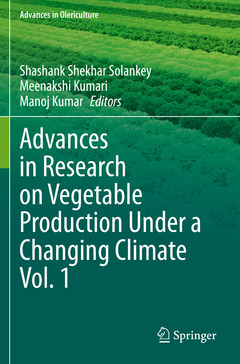Advances in Research on Vegetable Production Under a Changing Climate Vol. 1, 1st ed. 2021 Advances in Olericulture Series
Langue : Anglais
Coordonnateurs : Solankey Shashank Shekhar, Kumari Meenakshi, Kumar Manoj

A considerable change in climate at a global level will impact the vegetable cultivation and agriculture as a whole; subsequently affecting the world's food supply. Climate change per se is not necessarily harmful; the problems arise from extreme events that are difficult to predict (erratic rainfall patterns and unpredictable high and low temperatures), and consequently reduce crop productivity. Vegetables are in general more succulent (have 90% water) and are more sensitive to climatic vagaries. Sudden changes in temperature coupled with irregular precipitation at any phase of crop growth can affect the normal growth, flowering, pollination, fruit setting, fruit development and fruit ripening can decrease the yield. The irregular precipitation can also affect the soil salinity and is a major challenge in many vegetable growing areas. To mitigate the harmful impact of climatic change there is a urgent need to develop adequate adaptation strategies for adverse effect of climate change and the preference should be given on development of heat, cold, drought, flood and salinity stress tolerant genotypes along with climate proofing through conventional and non-conventional breeding techniques. Available evidence shows that there is a high probability of increase in the frequency and intensity of climate related natural hazards due to climate change and hence increases the potential threat due to climate change related natural disasters in the world. This book (Volume- I) will be basically useful for the researchers and postgraduate students with current challenges and mitigation strategies for increasing vegetable production under a changing climate.
Chapter 1. The Role of Research for Vegetable Production Under a Changing Climate: Future Trends and Goals.- Chapter 2. Challenges and opportunities in vegetable production in changing climate: mitigation and adaptation strategies.- Chapter 3. Selection of genotypes in vegetable crops for climate change adaptation.- Chapter 4. Response of Solanaceous vegetables to increasing temperature and atmospheric CO2.- Chapter 5. Climate change impact on cole crops and mitigation strategies.- Chapter 6. Impact of climate change on root crops production and mitigation strategies.- Chapter 7. Impact of climate change on leguminous vegetables productivity and mitigation strategies.- Chapter 8. Impact of climate change on bulb crops production and mitigation strategies.- Chapter 9. Impact of climate change on cucurbitaceous vegetables in relation to increasing temperature and drought.- Chapter 10. Impact of carbon sequestration and greenhouse gasses on soils.- Chapter 11. Impact of green house gasseson vegetable crops and atmosphere.- Chapter 12. Impact of heat on vegetable crops and mitigation strategies.- Chapter 13. Impact of drought and salinity on vegetable crops and mitigation strategies.
Dr. Shashank Shekhar Solankey is presently working as Assistant Professor–cum–Jr. Scientist (Horticulture: Vegetable Science) at Dr. Kalam Agricultural College, Kishanganj under Bihar Agricultural University, Sabour (Bhagalpur), India. He acquired Masters Degree in Vegetable Science from Acharya Narendra Deva University of Agriculture and Technology, Kumarganj, Ayodhya (India) in 2006 and Doctorate in Horticulture from Banaras Hindu University, Varanasi (India) in 2010. He has qualified ICAR-ASRB NET examination in 2008. He has worked as Research Associate at ICAR-IIVR, Varanasi, India. He has more than 7 years of experience in teaching and research. His prime targeted area of research is biotic and abiotic stress resistance as well as quality improvement in vegetables, particularly, solanaceous crops and okra. Dr. Solankey has supervised four M.Sc. students and handled several research projects. He has awarded with Best Teacher Award (2016) and Best Researcher Award (2016) by BAU, Sabour including these he has 14 International/ National/Institutional Awards as well as published 50 research papers, 07 review papers, 01 souvenir paper, 08 books, 01 abstract book, 36 book chapters, 15 popular articles, etc. He is also life time member of several societies, editorial board member and reviewer of many reputed journals.
Dr. Meenakshi Kumari is presently working as Senior Research Fellow in Department of Vegetable Science at Chandra Shekhar Azad University of Agriculture & Technology, Kanpur, Uttar Pradesh, India. She has specialization in Vegetable Science. She acquired Masters in Horticulture (Vegetable & Floriculture) from Bihar Agricultural University, Sabour (Bhagalpur), Bihar in 2016 and Doctorate in Vegetable Science from Chandra Shekhar Azad University of Agriculture & Technology, Kanpur, Uttar Pradesh (India) in 2019. She has qualified ICAR-ASRB NET examination in the Discipline of Vegetable Science in 2017 and qualified ICAR-
This book presents up to date studies in Olericulture Contributions from expert researchers in the field Covers climate change, carbon sequestration, greenhouse gasses
Date de parution : 04-2022
Ouvrage de 253 p.
15.5x23.5 cm
Date de parution : 04-2021
Ouvrage de 253 p.
15.5x23.5 cm
Thème d’Advances in Research on Vegetable Production Under a... :
© 2024 LAVOISIER S.A.S.


